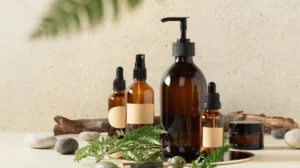Nigeria’s beauty market is evolving beyond trends and celebrity endorsements toward a values-driven, eco-conscious model. More consumers now prioritize brands that highlight transparency, ethical sourcing, and biodegradable packaging. Nigerian entrepreneurs have responded with skincare and hair-care lines based on indigenous plant extracts—shea butter, baobab oil, aloe vera, safou oil—and manufacturing processes designed to reduce waste.
Brands Leading the Charge
-
R&R Luxury crafts plant-based skincare using ethically sourced shea butter and black soap, while minimizing plastic and reinvesting in community collectives.
-
LIHA Beauty focuses on botanical formulas inspired by traditional wellness rituals, blending aromatherapy with culturally rooted ingredients and minimalist packaging.
-
Micohype Beauty Hair, a hair-cosmetics startup, produces ethically sourced wigs and extensions while training and empowering women artisans using eco-friendly supply chains.
These brands marry cultural authenticity with sustainable innovation, resonating with consumers seeking both quality and ethical impact.
Fast-Growing Market with Room to Grow
The cosmetics and personal-care sector now contributes billions to Nigeria’s economy, with eco and clean beauty playing a rapidly expanding role. Industry projections indicate Nigeria’s beauty market could exceed five billion dollars by 2026—boosted by natural product demand, social commerce growth, and rising disposable income.
Transparency, ingredient authenticity, and environmental responsibility help local brands stand out among established competitors, especially as consumers increasingly research products online before buying.

Sustainable Practices in Action
Eco-brands in Nigeria adopt sustainability throughout their operations:
-
Ethical sourcing: They collaborate with women’s cooperatives and fair-trade farms to ensure equitable participation and preserve traditional harvesting methods.
-
Eco-packaging: Refillable jars, biodegradable containers, and minimal plastic use are becoming the norm.
-
Waste reduction: Brands pursue zero-waste goals through recycling of offcuts and water recovery systems in production.
These practices reduce environmental impact and underscore brand differentiation in both domestic and international markets.
Ingredients with Cultural and Health Appeal
Nigerian botanicals carry both health benefits and cultural resonance. Shea butter’s moisturizing effects, baobab’s antioxidants, and black soap’s cleansing properties—and their ties to ancestral traditions—actively connect with consumers seeking ingredients they can trust. Aligning traditional remedies with modern formulations boosts brand credibility and consumer loyalty.
Digital Platforms and Consumer Engagement
Social media platforms (Instagram, TikTok, YouTube) fuel consumer awareness and peer recommendations around eco-beauty brands. Influencers now spotlight ingredient sourcing, founder stories, and clean beauty guidelines—helping emerging brands gain visibility without relying on mainstream retail. Many consumers, especially younger demographics, now prefer eco brands that emphasize minimal, multifunctional products.
Challenges Amid Growth Potential
Despite exciting momentum, eco-brands contend with structural obstacles:
-
Insufficient manufacturing infrastructure: Reliable laboratories and production facilities are scarce, limiting quality scaling.
-
Regulatory gaps: Weak enforcement on counterfeit products and quality control undermines consumer trust.
-
Imported input dependency: Many brands rely on imported packaging or raw materials, exposing them to currency risk.
-
Fragmented logistics and scale barriers: Expanding distribution and exporting under AfCFTA norms remains challenging for small brands.
Community and Social Impact
Eco-conscious brands often invest in social empowerment: R&R and Micohype train rural women artisans, offering skills and steady income—linking beauty production to local development. Brands also celebrate cultural heritage; LIHA’s Yoruba narratives and R&R’s emphasis on ancestral formulas bridge tradition and modern eco-brand identity.
Healthier Products for People and Planet
By avoiding harmful chemicals like parabens and sulfates, sustainable brands help mitigate skin irritation and long-term toxicity. At the same time, biodegradable ingredients and packaging cut pollution in watersheds and sensitive ecosystems, particularly among coastal communities.
Regional Relevance and Export Potential
Africa’s beauty sector is expanding fast, with growth expected from eight billion dollars in 2023 to more than ten billion by 2025. Given its market size and creative energy, Nigeria stands out as a leader. Sustainable brands are positioning well for export—leveraging AfCFTA and diaspora networks to enter global markets with authenticity and purpose.
Key Takeaways
-
Nigerian consumers increasingly choose beauty products with natural, transparent, and eco-conscious credentials.
-
Local brands are succeeding by combining traditional ingredients with ethical practices and contemporary design.
-
The market is growing rapidly—expected to exceed five billion dollars by 2026.
-
Sustainability is embedded through ethical sourcing, zero-waste processes, and conscious packaging.
-
Brands face scaling challenges—capacity constraints, regulatory gaps, and FX exposure remain hurdles.
-
Social storytelling, cultural roots, and influencer traction empower market entry and visibility.
Conclusion
Nigeria is experiencing a shift toward green beauty, anchored in indigenous ingredients and ethical entrepreneurship. As consumers demand healthier products and environmental integrity, sustainable brands rooted in tradition and transparency are carving out distinct value in the market.
With stronger infrastructure, supportive policy, and access to export channels, these brands could lead the growth of African clean beauty—delivering economic, social, and cultural dividends across communities and markets.







